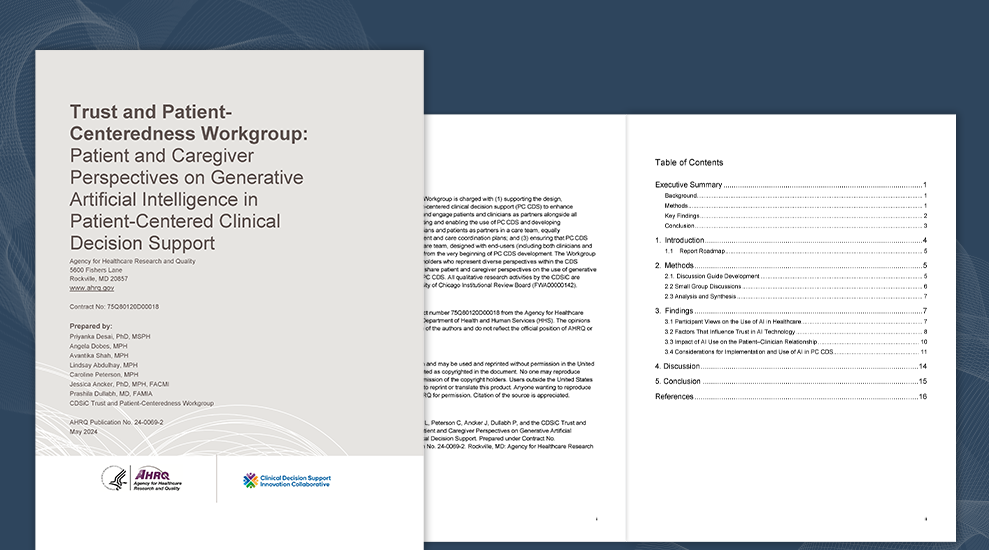
This report provides descriptions of patient and caregiver perspectives on the use of generative artificial intelligence in patient-centered clinical decision support.
Developed by the AHRQ Clinical Decision Support Innovation Collaborative's (CDSiC) Trust and Patient-Centeredness Workgroup, this report describes patient and caregiver perspectives on the use of generative artificial intelligence (AI) in patient-centered clinical decision support (PC CDS), factors that impact trust in AI technology, and AI’s impact on trust and the patient-clinician relationship, while providing specific considerations for the development and implementation of AI-supported PC CDS tools.
As the use of AI in healthcare settings continues to increase, there is a fundamental need to understand patient and caregiver viewpoints on AI’s role in healthcare, and particularly in the implementation of PC CDS. PC CDS can harness AI to collect and analyze data, streamline communication between patients and their care team, and inform clinical decision making. Given the centrality of trust and patient-centeredness to effective PC CDS, it is imperative to incorporate patient and caregiver views throughout the development and implementation of AI-powered PC CDS tools.
About the Report
Based on a series of small group discussions with patient and caregiver advocates, this report documents the perspectives of patients and caregivers on the use of AI in healthcare, with a specific focus on the use of generative AI in PC CDS. These discussions generated key findings on four critical AI-related topics:
- Participant views on the use of AI in healthcare.
- Factors that influence trust in AI technology.
- The impact of AI use on the patient-clinician relationship.
- Considerations for the implementation and use of AI in PC CDS.
Overall, participants were mostly optimistic about the use of AI in PC CDS and believed in AI’s potential to facilitate simple clinical scenarios, reduce lag time, and improve the efficiency of patient-provider communication. However, they also expressed potential concerns, as well as potential opportunities that could improve their trust in AI-supported PC CDS. The report describes these perspectives in detail.
How To Use This Report
This report contributes to growing literature that explores patient and caregiver perspectives on the use of AI in healthcare, with a specific focus on its use in PC CDS. The use of these tools has several implications for clinical decision making and the patient-clinician relationship.
Stakeholders can take into account several considerations identified in this report to foster trust and patient-centeredness in AI-supported PC CDS tools. Patient-facing AI tools for PC CDS that incorporate these considerations throughout their design and implementation phases have the potential to improve access to health information, enhance patient autonomy, and foster engagement.
Suggested Citation: Desai P, Dobes A, Shah A, Abdulhay L, Peterson C, Ancker J, Dullabh P, and the CDSiC Trust and Patient-Centeredness Workgroup. Patient and Caregiver Perspectives on Generative Artificial Intelligence in Patient Centered Clinical Decision Support. Prepared under Contract No. 75Q80120D00018. AHRQ Publication No. 24-0069-2. Rockville, MD: Agency for Healthcare Research and Quality; May 2024.





